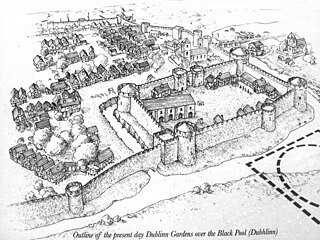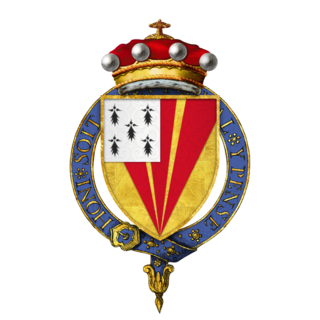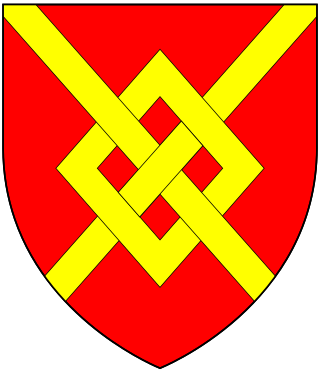James Audley may refer to:
- James Audley (died 1369) (c. 1318–1369), Knight of the Garter
- James Audley, 2nd Baron Audley (1312/13–1386), English peer
- James Audley (died 1272) (1220–1272), English baron
James Audley may refer to:

Earl of Castlehaven was a title in the Peerage of Ireland, created on 6 September 1616. It was held in conjunction with the Barony of Audley, the Barony of Audley of Orier, and the Barony of Audley of Hely.

Baron Audley is a title in the Peerage of England first created in 1313, by writ to the Parliament of England, for Sir Nicholas Audley of Heighley Castle, a member of the Anglo-Norman Audley family of Staffordshire.

James Tuchet, 5th Baron Audley, 2nd Baron Tuchet of Heleigh Castle was an English peer.

Audley End House is a largely early 17th-century country house outside Saffron Walden, Essex, England. It is a prodigy house, known as one of the finest Jacobean houses in England.

Sir James Audley, KG was one of the original knights, or founders, of the Order of the Garter. He was the eldest son of Sir James Audley of Audley in Staffordshire.

John Neville, 3rd Baron Neville, was an English peer, naval commander, and soldier. His second wife was Elizabeth Latimer who was the 5th Baroness Latimer in her own right.
Touchet is a surname, and may refer to:
Events from the 1360s in England.

The Stanley family is an English family with many notable members, including the Earls of Derby and the Barons Audley who descended from the early holders of Audley and Stanley, Staffordshire. The two branches of the Audley family were made Barons Audley but both ended in the male line in the 14th century, after which their considerable estates were passed to a number of female heiresses, while the Stanleys would be elevated in the 15th century first to Barons Stanley and then Earls of Derby, a title they continue to hold.
Tuchet is a surname, and may refer to:

James Audley, 2nd Baron Audley of Heighley Castle, Staffordshire, was an English peer. He was the son and heir of Nicholas Audley, 1st Baron Audley (1289–1316) by his wife Joan Martin, who was the daughter of William Martin, feudal baron of Barnstaple, and Marcher Lord of Kemes. She was posthumously the eventual sole heiress of her brother William FitzMartin to Barnstaple and Kemes.

John Tuchet, 8th Baron Audley, 5th Baron Tuchet was an English peer.
John Audley may refer to:

John Tuchet, 4th Baron Audley, 1st Baron Tuchet was an English peer.

Sir Neil Loring, KG (also "Neel", "Nele", "Nigel", "Loryng", "Loringe"; Latin: Nigellus; was a medieval English soldier and diplomat and a founding member of the Order of the Garter, established by King Edward III in 1348. The central character in two historical novels by Sir Arthur Conan Doyle, Sir Nigel and The White Company, is loosely based on Neil Loring.
Audley is a surname of Old English origin derived from the village of Audley, Staffordshire. Notable people with the surname include:

Sir James de Audley [Knight], Justiciar of Ireland, was an English baron and magnate. He became Chief governor of Ireland, seated at Dublin Castle, and the son-in-law of crusader William Longespée the Younger.
Baron Clavering was a title in the Peerage of England. It existed as a feudal barony by tenure, before being created by Writ of summons to Parliament of Robert fitzRoger, as Baron FitzRoger in 1295 until his death in 1310. His son John de Clavering, was created by writ of summons to Parliament as Baron Clavering in 1299 until his death in 1332.

Ralph Basset, 3rd Baron Basset of Drayton KG was a medieval English soldier knight, one of the earliest-appointed Knights of the Garter.

Sir Hugh de Audley of Stratton Audley, Lord of Stratton Audley, was a 13th- and 14th-century English noble. During his life he acted as Constable of Montgomery Castle, Sheriff of Shropshire, Sheriff of Staffordshire, Justice of North Wales, Keeper of Selkirk Forest, and acted as an ambassador to France. Hugh participated in the rebellion of Thomas, 2nd Earl of Lancaster and surrendered prior to the Battle of Boroughbridge in 1322. He remained a prisoner held at Wallingford Castle until he died in 1325.